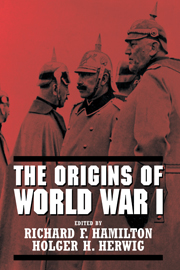Book contents
- Frontmatter
- Contents
- List of Tables and Maps
- Contributors
- Acknowledgments
- 1 World Wars: Definition and Causes
- 2 The European Wars: 1815–1914
- 3 Serbia
- 4 Austria-Hungary
- 5 Germany
- 6 Russia
- 7 France
- 8 Great Britain
- 9 Japan
- 10 The Ottoman Empire
- 11 Italy
- 12 Bulgaria, Romania, and Greece
- 13 The United States
- 14 Why Did It Happen?
- 15 On the Origins of the Catastrophe
- Appendix A Chronology, 1914
- Appendix B Dramatis Personae
- Appendix C Suggested Readings
- Index
11 - Italy
Published online by Cambridge University Press: 05 August 2012
- Frontmatter
- Contents
- List of Tables and Maps
- Contributors
- Acknowledgments
- 1 World Wars: Definition and Causes
- 2 The European Wars: 1815–1914
- 3 Serbia
- 4 Austria-Hungary
- 5 Germany
- 6 Russia
- 7 France
- 8 Great Britain
- 9 Japan
- 10 The Ottoman Empire
- 11 Italy
- 12 Bulgaria, Romania, and Greece
- 13 The United States
- 14 Why Did It Happen?
- 15 On the Origins of the Catastrophe
- Appendix A Chronology, 1914
- Appendix B Dramatis Personae
- Appendix C Suggested Readings
- Index
Summary
I could be wrong, but I see our situation towards Austria as insecure: … one spark, the death of the old emperor, the succession of the new who is openly hostile to us, can provoke a conflict, however contrary to the interests of the two countries.
Paolo Spingardi, Minister of War, 1911Richard Bosworth, a leading specialist, describes Italy in 1914 as “the Least of the Great Powers.” Italy's allies, Austria-Hungary and Germany, paid it scant attention that July. Vienna and Berlin excluded Rome from their policy discussions in the aftermath of the murder of Archduke Franz Ferdinand. And they did not inform the Italians of the terms of the ultimatum Vienna handed Belgrade on 23 July. Austria-Hungary, from the start, discounted the likelihood of Italian military support for the Triple Alliance. Germany feared that any information passed on to Rome would quickly find its way to St. Petersburg. During those four weeks, neither Austria-Hungary nor Germany treated Italy as a valued ally, much less as a great power.
Italy's first response to the war was a declaration of neutrality, this announced on 3 August 1914. That decision was largely the work of one man, Foreign Minister Antonio di San Giuliano. Italy at that point was the Continent's largest neutral nation. Both sides in the struggle, accordingly, competed for its support, encouraging either continued neutrality or active participation. Italy's leaders, from the start, welcomed these offers and for some nine months prepared for combat and weighed the options.
- Type
- Chapter
- Information
- The Origins of World War I , pp. 356 - 388Publisher: Cambridge University PressPrint publication year: 2003



